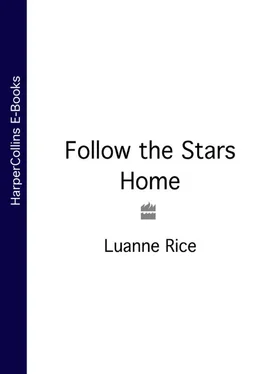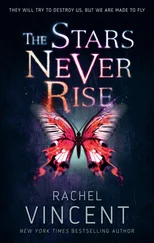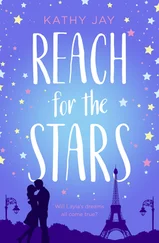He told himself he was a doctor, his compassion was natural. Dianne’s eyes showed everything. Her hair was the color of Cape Cod marshes in autumn, golden in the October sun. She smelled like paint, lumber, and the sea. Frustration often creased her brow, but when she looked at Julia, the lines would disappear into such deep love that Alan sometimes felt pressure in his throat.
Psychiatrists – and Malachy Condon – would say he loved his sister-in-law because she was totally inaccessible. Fear of commitment? No problem – pick someone your brother has left, a woman who hates your family with a passion. Alan was screwed up in the area of relationships – he knew it well. He dated good women. They were all better than he deserved. He had a lousy habit of forgetting to call after the third or fourth time. He had never been married, and as much as he loved children, he had none of his own. And it would probably stay that way.
“Dianne’s hoping for a good summer,” Mrs. Robbins said.
“I know,” Alan said.
“I’ll be home to help her out more.”
“Do you think Dianne would consider a baby-sitter?” he asked. “I’m thinking of someone, kind of like a mother’s helper.”
“She might,” Mrs. Robbins said. “You could try.”
“Coming from me, I’m not sure.”
“You’re very good to her, Alan,” she said. “She might not show it, but I know she appreciates it.”
“It doesn’t matter,” he said.
The librarian’s eyes connected with his. “It matters a lot,” Mrs. Robbins said. She took his damp towel and hung it on the metal handle of her cart. Alan knew she would wash it and bring it back for him next week. He understood that Lucinda wished that he had been the one to win. That Dianne had stayed with Alan, never married Tim at all.
Things that Alan wished himself.
Amy came home from school early. Her mother was in bed, and her mother’s boyfriend, Buddy, was rehearsing with his band. They were in someone’s garage down the street, and Amy could hear the ugly metal sound. Who wanted to make music that sounded like train wrecks? But the good news was, he was busy and she would hear if he stopped playing.
The shades were pulled down, but spring sunshine outlined the window frames like square halos. Emptied beer bottles gave off their usual fragrance. Amy walked through the dark room with a can of pine-scented air freshener, spraying full blast. She thought of brooks and forests, hoot owls and whippoorwills. Peeking into her mother’s room, she saw her mother lying under the blankets.
“Mama?” Amy whispered.
Her mother didn’t move. Thick curtains were pulled over Venetian blinds, so the air was dark and heavy as brown corduroy. It was stiflingly hot, and Amy resisted the impulse to throw open the window. She knew her mother needed her rest. Wanting company, she went back to the living room.
“Hi, puppy,” she said, falling on her knees before the dog cage.
The young dog bared his teeth, growling and cowering in the back of the cage. Buddy, training him to be a guard dog, had named him Slash, but there was no way on earth Amy would ever call him that.
“I’m your friend,” she said.
“Grrrr.”
“You don’t believe me?” Amy ran to the kitchen and came back with two slices of American cheese – even Buddy wouldn’t miss two little slices. Breaking them up into small pieces, she placed one near the front of the cage.
“Grrr,” the dog growled. Amy thought back to an early time in Dr. McIntosh’s office. Amy had been scared – she had had a sore throat, burning like fire, and a fever of one hundred and four. She had been so afraid to open her mouth. Dr. McIntosh hadn’t rushed her at all, just won her over slowly with a lollipop, a story about dolphins, and his gentle voice.
“I’m your friend, puppy,” Amy said, trying to imitate Dr. McIntosh’s voice. And it was working, because soon the small black dog began creeping forward. Both eyes on Amy, he inched ahead.
It took ten whole minutes, but the little dog finally took the cheese. Then another piece, and another. Very carefully Amy unlatched the metal door. The hinges squeaked, and the dog scurried back. But Amy just kept putting out cheese, and the little guy came up to eat it all. Soon he was eating out of her hand. His coat was bristly and warm, and he had that baby-animal smell that made Amy wish she were a dog.
“The music!” Amy said, realizing one second too late that it had stopped.
“What’s going on here?” Buddy asked, standing in the door.
Amy tried to shield the dog from his sight. The room was so dark, even with the window halos, he might not be able to see. The little dog could crawl back into his lair, and everyone would be safe. Amy lay full-length in front of the cage, praying for the dog to retreat.
“Nothing,” Amy said. “How was band practice?”
“Lousy. I broke a string, and our bassist had to get to work. What –”
“You sounded great,” Amy said, her heart pounding. Reaching behind her, she tried to shove the puppy back.
“You heard us?”
“Yes. Even with a broken string, you play the best. Who’s that famous guy, the one Mom listens to – not James Taylor, the other one …”
“Eric Clapton?”
“Yes! You play better than him.”
“Huh,” Buddy said. No one could get more out of the word “huh” than Buddy. Coming from his string-thin lips, he could make the word sound like a ton of cement falling from the Empire State Building. But just then he made it sound like an expression of wonderment. When Ponce de León had emerged from the hot jungle to find the Fountain of Youth his “huh” had sounded just like Buddy’s.
“Much better,” Amy said warmly, her chest cracking with anxiety. The puppy had discovered her cheese-flavored fingers again and was licking them madly.
“You think? I think I’m more Hendrix myself. When my string snapped, I damn near … what’s that?”
“That noise?” Amy asked, thinking fast. The puppy was slurping away.
“Did that dog get out?” Buddy asked.
“No,” Amy said immediately, pushing the puppy inside his cage, blocking the door with her outstretched arms. “I let him out, it’s my fault, I just wanted –”
With one motion Buddy lifted Amy away from the cage and tossed her onto the sofa. Reaching in, he grabbed the dog by the scruff of his neck. Amy’s eyes were open wide. She watched the terrified puppy dangle from Buddy’s hand like a ham on a hook.
“What did I tell you?” Buddy asked, and Amy didn’t know whether he was talking to her or to the dog.
“It’s my fault,” Amy said again. Her voice sounded funny, like the sandpaper she sometimes used in art class.
“I don’t care about fault,” Buddy said softly. “What I care about is obedience.”
“Don’t hurt him,” Amy said.
“What good is a guard dog that won’t obey? You teach them young, or you have to shoot them later.”
“Don’t hurt him though,” Amy said.
Without another word Buddy kicked the dog with his pointy cowboy boot. The dog yelped in pain, and Buddy kicked him again. “For your own good,” Buddy said, holding him down. “For your own stupid good.”
Amy started to sob. The little dog couldn’t get away. He struggled and squirmed, yelping loudly. Buddy kicked him over and over, and when he was done, he hurled the dog into his cage. Picking up a rolled-up newspaper, he smacked the palm of his open hand.
“Got it now?” he asked. He never hit Amy, but she had the definite feeling he was threatening her then. “Are we clear who’s master around here?”
In the bedroom, blankets rustled. Amy’s stomach ached. She didn’t know what she wanted more, for her mother to rescue the dog or for her to stay out of the way.
Читать дальше












